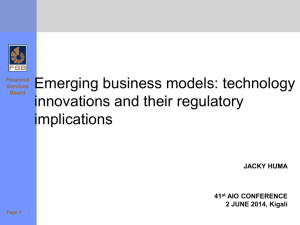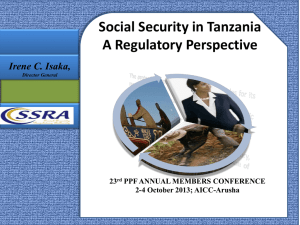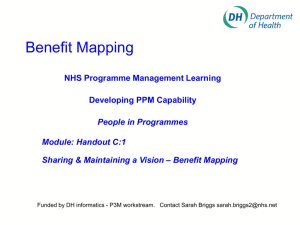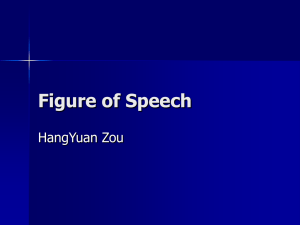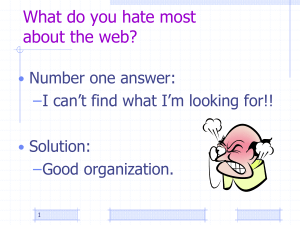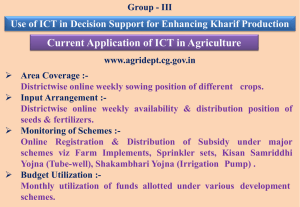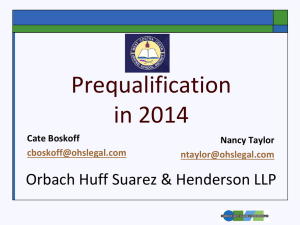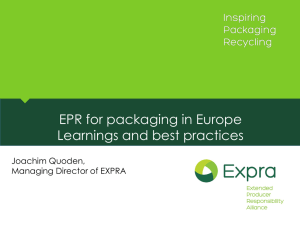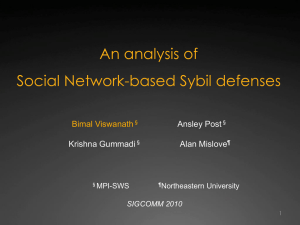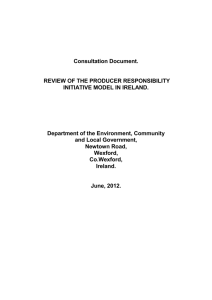the system - fest.a cropak
advertisement
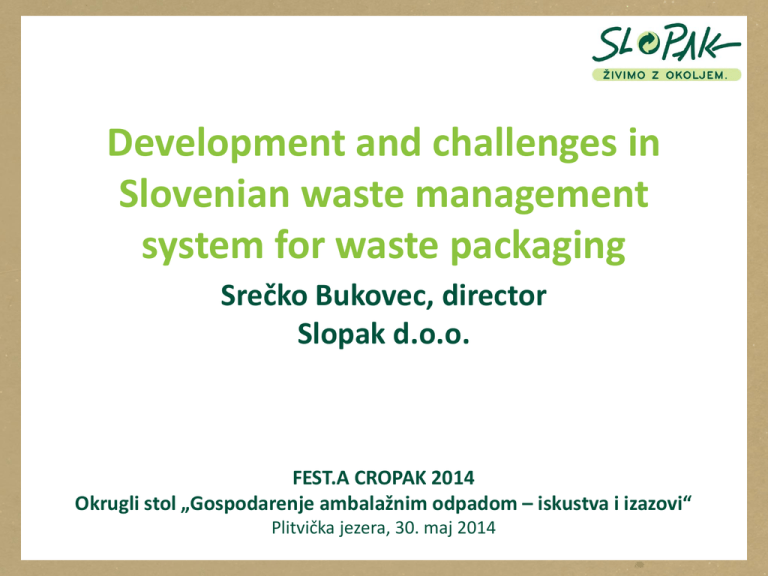
Development and challenges in Slovenian waste management system for waste packaging Srečko Bukovec, director Slopak d.o.o. FEST.A CROPAK 2014 Okrugli stol „Gospodarenje ambalažnim odpadom – iskustva i izazovi“ Plitvička jezera, 30. maj 2014 Slopak • First compliance scheme for waste packaging, the only scheme for waste tyres and phytopharmaceuticals in Slovenia • 10 years in operation • Member of organization Pro Europe Green Dot Programmes • waste packaging • waste tyres • waste medicines • waste electrical and electronic equipment • waste batteries • waste phytopharmaceuticals Basic concept of EPR in Slopak‘s model (1) Compliance scheme is 100% owned by obliged industry Compliance scheme operate on not-for-profit principle and returns the profit back to the system Compliance scheme controls the expenditure of the packaging fee and influences the optimization of the infrastructure Calculation of the packaging fee for each material is made equitably (no subvention of the materials) Non-discrimination among all of the obliged companies Transparency is crucial Basic concept of EPR in Slopak‘s model (2) Cooperation with local municipalities on long term basis Responsibility for the fulfillment of the environmental targets and compliance with the legislation is achieved through work, not just by signing the contract Additional motivation of separating waste and establishment of infrastructure for waste collection at the source Continuous independent educational campaigns and joint activities with obliged companies and local municipalities Objective is constant improvement of the system‘s efficacy, additional development of the services, that can lead to more cost effective system in all phases Ministry of environment Ministry of economy Customs administration Environment agency Inspectorate of environment Tax administration INDUSTRY = OBLIGED COMPANIES SUBCONTRACTORS Clear roles = transparent relations= system works LOCAL WASTE MANAGEMENT COMPANIES SYSTEM‘S FINANCING SYSTEM‘S OPERATORS LEGISLATION System in 2003 (in SLO system of shared responsibility COMPLIANCE SCHEMES •collective •individual INHABITANTS LEGISLATION System after 10 years... Ministry of environment Customs administration Ministry of economy Environment agency Inspectorate of environment COMPLIANCE COMPLIANCE COMPLIANCE SCHEME 4 SCHEME 5 Tax administration INDUSTRY = OBLIGED COMPANIES SYSTEM‘S OPERATORS SUB CONTRACTORS SUBCONTRACTORS Non-transparent COMPLIANCE relations SCHEME 2 = system works COMPLIANCE SCHEME 6 improperly LOCAL WASTE MANAGEMENT COMPANIES COMPLIANCE SCHEME 1: SLOPAK FOREIGN RECYCLING COMPANY INHABITANTS SYSTEM‘S FINANCING SCHEME 3 Conditions needed for good system functioning Legislation has to clearly define responsibilities of each stakeholder in the system Stakeholder roles have to be synergistic, without conflict of interests System should stimulate cooperation, not conflicts and blocking between the stakeholders In case of competitive model, the terms must be clear and verifiable for equal competiveness Strong role of the government at the control and prevention of infringements ……. State control through whole system (obliged companies, compliance schemes, subcontractors, local municipalities, recyclers, achievement of environmental targets) In case of competitivness on the level of compliance schemes, criteria is needed for establishment of compliance schemes and to prevent vertical connections (compliance schemes owned by subcontractors and local municipalities) Accessibility of the data in real time, entry of the data in the system must be closed (mistakes, abuses) In case of more compliance schemes, clearing house is mandatory System functioning is partially in public interest and the prevail of profit interest in the chain is not optimal! Key issues Environmental policies should follow: Primarily profit interests, secondary environmental targets? or Primarily environmental targets, secondary profit interests? Challenges for the future Is competiveness on level of compliance schemes correct path for achieving targets? Can different compliance scheme models coexist (non-for-profit, profit, vertically integrated…?) Big danger is the prevail of the vertically integrated schemes (owned by subcontractors) Costs of subcontractors represent 85% – 90% of all costs and a competiveness between them can assure the optimization of the system Competiveness on the level of compliance schemes results in bigger complexity, need of higher control and additionally need for clearing house Do we want to achieve the environmental targets with cost optimization or do we want the profit flow out of the system (profit doesn‘t return back to those, who are financing the system) Srecko.Bukovec@Slopak.si www.slopak.si THANK YOU.
